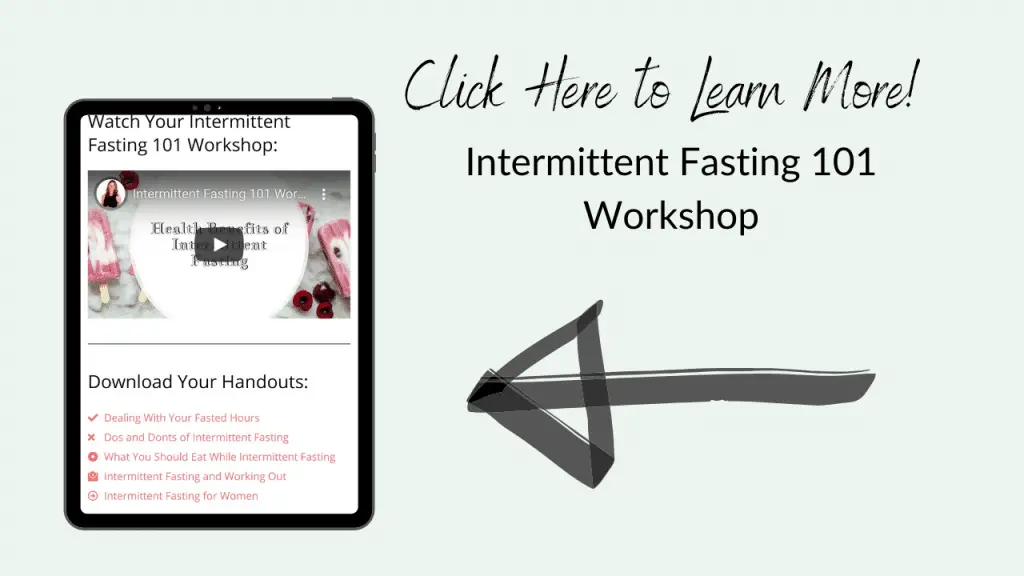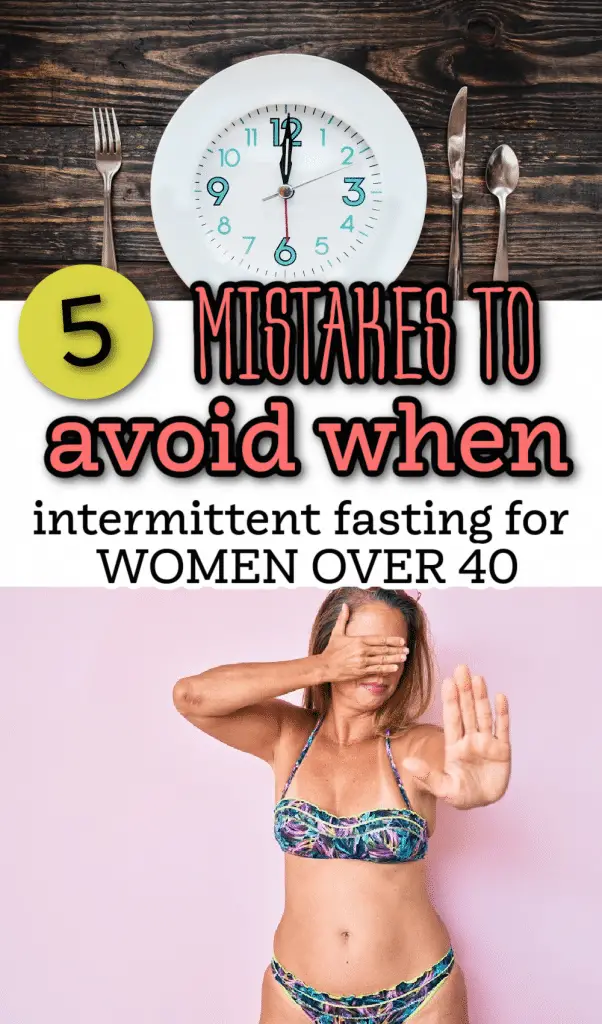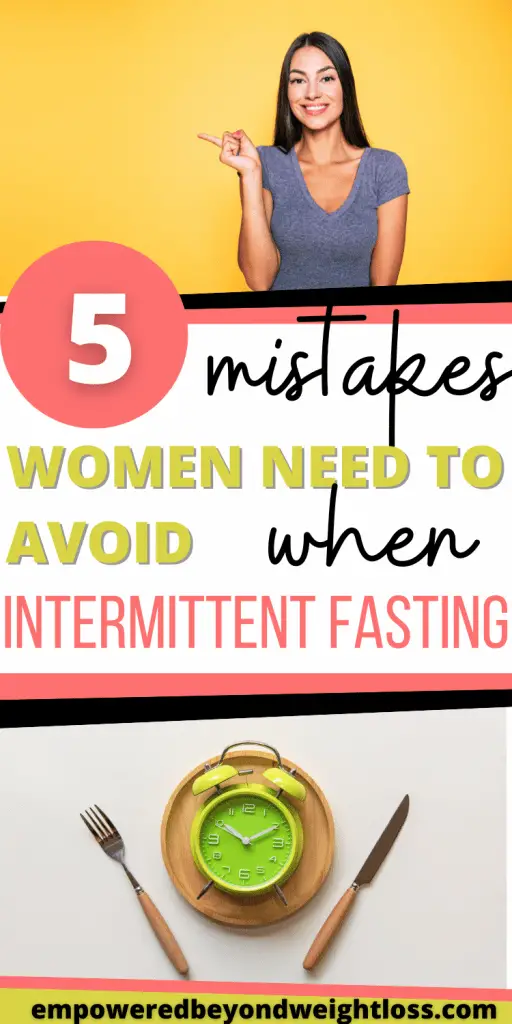I summarize intermittent fasting for women over 40 in two simple guidelines: fast long enough to achieve ketosis and don’t fast every day. However, some troubleshooting might be necessary to adjust your intermittent fasting protocol as you go. Today’s article is meant to help you do just that.
By the way, don’t forget to check out my Intermittent Fasting 101 Workshop to learn more about intermittent fasting for women over 40. It includes:
- How to succeed even if you have tried before
- 5 PDF downloads
- Healing through modified fasting

Top Intermittent Fasting Mistakes for Women Over 40
First, how is intermittent fasting for women over 40 different from younger women? Women over 40 tend to have a slower metabolism, may have hormonal imbalances, and may find it more difficult to change their lifestyle. These top intermittent fasting mistakes address some of these differences that affect women over 40.
1. Choosing a Fasting Window That Is Too Short
Women, in general, benefit from a longer fasting window that isn’t implemented every single day of the week, particularly women over 40. Not only will a longer fasting window help ensure that your caloric consumption decreases enough to lose weight (if that’s one of your goals), but it will also help you benefit from the metabolic switchover you want.
Ketosis
Switching to fat-burning (or ketosis) is what I enjoy most about intermittent fasting. It makes it so effective at improving your metabolic health and losing weight. Most people start exhausting their glycogen stores after fasting for about 12 hours. However, for your body to produce enough ketones to be in ketosis, you most likely need to fast for at least 16-18 hours (unless you eat keto, of course!). Then, you would want to enjoy this metabolic switchover for a while. I recommend a 20-24 hour fast for everyone, but women over 40 will find it even more helpful as they may struggle with insulin resistance.
Alternate-Day Fasting Benefits
Fasting longer and less frequently is an effective intermittent fasting option for women over 40. Alternate-day fasting, in particular, has some major benefits. Alternate-day fasting has been shown to increase lifespan in mice. Also, a study where the metabolic effects of fasting were observed at the 12, 36, and 72-hour marks found that the resting metabolic rate of the subjects increased at 36 hours. Read What Is Alternate-Day Fasting and Why It Works to learn more.

2. Not Cycling Their Diet and Intermittent Fasting Methods
If intermittent fasting for women over 40 involves longer fasts, it also means fewer fasting days. For example, alternate-day fasting would be a good goal once or twice weekly. If you go for OMAD (One Meal a Day) or the Warrior Diet (fasting for 20 hours), I recommend some days off once in a while, particularly before your period.
Again, I want to emphasize that I am not about making up rules. I want you to know how you feel on your fasting days. After gaining enough fasting experience, you will know the difference between how you feel on different fasting days. Some days, you will feel hungry, but you will be energetic and happy to keep fasting. Some days, you will feel weak and too hungry to fast longer. Listening to your body’s cues is an excellent way to cycle your fasting days.
Cycling Your Diet
Similarly to not always fasting the same length every single day of the month, it’s a good idea to change things up with your diet. For one thing, it will help you determine which way of eating makes you feel your best, but also, you will notice that your body craves different types of nourishment at different times. Sometimes, eating keto may be just what you need. At other times, you may want to include more carbs in your diet.

3. Not Eating Enough Protein
Again, listening to your body will serve you well in this case. I like to break my fast with the Power Shake because it is light, satisfying, and filled with vitamins and minerals. However, I have noticed that sometimes, I crave meat to break my fast. On those days, I will eat some chicken breast or canned tuna. As I mentioned, intermittent fasting for women over 40 can be different since women over 40 have to deal with decreasing muscle mass. Increasing your protein intake may help preserve your muscle mass.
How Much Protein?
The recommended protein intake for women is between 10 to 35% of your macronutrients, but as you age, you should aim toward the higher end of that range. Strength training is another effective tool to stay strong and mitigate muscle mass loss. Remember, you can combat muscle loss as you age, but you cannot gain experience unless you age!

4. Not Drinking Enough Water
It’s easy not to drink enough water. You are busy and forget to drink. The first thing you should do whenever you feel hungry is drinking a large glass of water. See how you feel after that. Most women need 74 ounces or more than 9 cups of water daily. Did you know that dehydration is one of the ten most frequent causes of hospitalization for people over 65? I was surprised to learn that! As you age, your thirst sensation decreases and your renal water retention (Source: Hydration in the Aging). Drinking enough water is essential at any age, but it is a useful guideline that should be included in any intermittent fasting protocol for women over 40.

5. Not Dealing With Sleep Issues
Poor sleep is another issue that tends to arise with age. Hormonal changes like the loss of estrogen and progesterone are contributing factors. If you have trouble going to sleep and staying asleep, be aware that there are things you can do to help improve your sleep. Examples are implementing some sleep habits like going to bed early every night and turning off your screens an hour before bed. It turns out that exercise is another excellent sleep aid. Make sure you exercise daily (not right before bedtime).
Natural Sleep Help
Lastly, I have enjoyed a tart cherry concentrate to sleep more soundly. Tart cherries are naturally rich in melatonin, the hormone responsible for good sleep. Women over 40 who practice intermittent fasting will find that their sleep improves. However, ensuring proper sleep in one way or another is crucial.

Intermittent Fasting for Women Over 40 Video
In Summary
Intermittent fasting for women over 40 is not hugely different from younger women. However, more mature women need to be aware of the natural biological processes that may make weight loss more difficult and affect overall health, like a decrease in metabolism in muscle mass. Moreover, the decrease in progesterone and estrogen accompanying menopause will impact sleep and cause weight gain. Fortunately, the answer is simple: intermittent fasting and exercise! And that’s what I am here to help you with.





